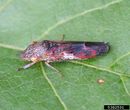Biological Invasions (2015) 17, 2963-2973
From Pestinfo-Wiki
 | Selected publication you are invited to contribute to the discussion section (above tab) |
Invasion pathway risk analysis for the glassy-winged sharpshooter (Homalodisca vitripennis): survival and reproductive success following simulated air transportation
Biological Invasions 17 (10), 2963-2973
Abstract: The glassy-winged sharpshooter, Homalodisca vitripennis, is an insect that transmits the economically important plant pathogen Xylella fastidiosa. Homalodisca vitripennis has been widely studied in North America and the characteristics that make the insect highly successful in new geographic areas are well understood. However, there is a paucity of information on the invasion pathways for long-distance dispersal that have allowed the insect to spread from mainland North America to Hawaii, Easter Island, French Polynesia and the Cook Islands. One potential means of introduction is via motile insects transported in the cargo holds of aircraft. Laboratory studies were undertaken in California to determine the viability of H. vitripennis after 24 h of a temperature, humidity and light regime simulating pressurised cargo hold conditions. At all temperatures tested (5, 11 or 22 °C) female adults were capable of surviving whether or not they had access to food and, to a much lower extent, were able to reproduce successfully when re-introduced on a suitable oviposition host plant. This research increases our understanding of the level of risk associated with long-distance air transport as pathway of entry for H. vitripennis into countries currently free of the pest.
(The abstract is excluded from the Creative Commons licence and has been copied with permission by the publisher.)
Link to article at publishers website
Database assignments for author(s): Geoff M. Gurr, Mark S. Hoddle
Research topic(s) for pests/diseases/weeds:
quarantine treatments/regulations/aspects
Pest and/or beneficial records:
| Beneficial | Pest/Disease/Weed | Crop/Product | Country | Quarant. |
|---|---|---|---|---|
| Homalodisca vitripennis |